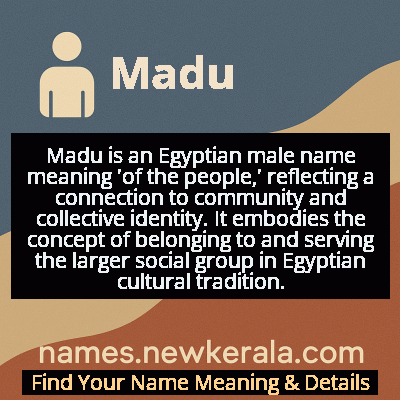Madu Name Meaning & Details
Origin, Popularity, Numerology Analysis & Name Meaning of Madu
Discover the origin, meaning, and cultural significance of the name MADU. Delve into its historical roots and explore the lasting impact it has had on communities and traditions.
Name
Madu
Gender
Male
Origin
Egyptian
Lucky Number
3
Meaning of the Name - Madu
Madu is an Egyptian male name meaning 'of the people,' reflecting a connection to community and collective identity. It embodies the concept of belonging to and serving the larger social group in Egyptian cultural tradition.
Madu - Complete Numerology Analysis
Your Numerology Number
Based on Pythagorean Numerology System
Ruling Planet
Jupiter
Positive Nature
Optimistic, inspirational, and creative.
Negative Traits
Scattered, exaggerating.
Lucky Colours
Yellow, gold, purple.
Lucky Days
Thursday.
Lucky Stones
Yellow sapphire.
Harmony Numbers
1, 2, 9.
Best Suited Professions
Arts, writing, communication.
What People Like About You
Creativity, optimism.
Famous People Named Madu
Madu
Ancient Egyptian Official
Royal scribe and administrator during the 12th Dynasty
Madu
Nubian Merchant
Facilitated commerce between Egypt and Nubia during New Kingdom
Madu
Modern Egyptian Scholar
Specialized in preserving and translating ancient Egyptian texts
Name Variations & International Equivalents
Click on blue names to explore their detailed meanings. Gray names with will be available soon.
Cultural & Historical Significance
Throughout Egyptian history, the name Madu appears in various contexts from the Old Kingdom through the Greco-Roman period, demonstrating its enduring appeal. It reflects the Egyptian cultural value of ma'at (cosmic order and balance), where each person had a defined place and responsibility within society. The name's persistence across millennia suggests it represented an ideal of service and connection to one's community that remained relevant despite changing political and social circumstances in ancient Egypt.
Extended Personality Analysis
Individuals named Madu are typically perceived as community-oriented, diplomatic, and possessing strong social intelligence. They often exhibit natural leadership qualities combined with a genuine concern for the welfare of others, making them effective mediators and organizers. Their strength lies in their ability to understand diverse perspectives and bring people together toward common goals, reflecting the name's meaning of being 'of the people'.
These individuals tend to be practical, grounded, and reliable, with a strong sense of responsibility toward their family and community. They often excel in roles that require building consensus and maintaining social harmony. While they may not seek the spotlight, their quiet competence and genuine connection to others often position them as respected figures within their social circles. Their personality combines traditional values with adaptive thinking, allowing them to navigate complex social situations with grace and effectiveness.
Modern Usage & Popularity
In contemporary times, the name Madu maintains a presence primarily among Egyptian families with strong connections to their cultural heritage, though it remains relatively uncommon compared to more popular Arabic names. It has experienced a modest revival in recent years as part of a broader trend of rediscovering ancient Egyptian names, particularly among educated urban families in Cairo and Alexandria. The name is occasionally used in other African countries, especially those with historical ties to ancient Egypt, and has gained some recognition through diaspora communities in Europe and North America. While not among the top names in modern Egypt, its usage reflects a conscious choice to honor ancestral traditions and cultural identity.
Symbolic & Spiritual Meanings
Symbolically, Madu represents the interconnectedness of the individual with the collective, embodying the Egyptian philosophical concept that personal identity is intrinsically linked to community membership. The name carries connotations of service, responsibility, and the idea that true strength comes from unity rather than individual achievement. It symbolizes the bridge between different social strata and the importance of maintaining social harmony, reflecting the ancient Egyptian belief in cosmic order (ma'at) where every person has a role in maintaining balance. Metaphorically, it suggests that one's greatest fulfillment comes from contributing to the wellbeing of the community rather than pursuing purely personal ambitions.

